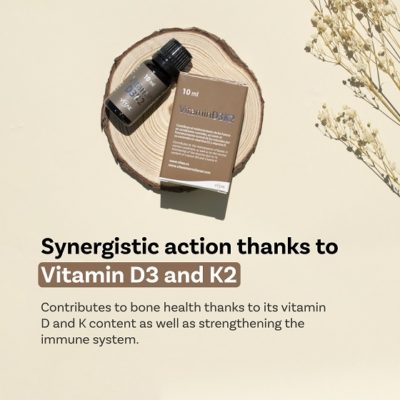Vitamins are very important for our body since they are substances that we need for normal cellular functioning, growth and development. There are a total of 13 essential vitamins: A, C, D, E, K, B1 (thiamine), B2 (riboflavin), B3 (niacin), B6 (pyridoxine), B12 (cyanocobalamin), Folate (folic acid and B9), Pathotenic acid (B5), Biotin (B7). Synergies of them are very important (specially synergy between vitamins D3 and K2). They can be grouped into two categories: fat-soluble vitamins and water-soluble vitamins.
- Fat-soluble vitamins: They are stored in the liver, fatty tissue and muscles of the body. They are more easily absorbed by the body since they are present in dietary fat. The four fat-soluble vitamins are A, D, E and K.
- Water-soluble vitamins: they are not stored in the body and are vitamin C and all the B vitamins. They are vitamins that must be consumed regularly to avoid deficiencies or deficiencies in the body.
What is vitamin D?
It is a type of fat-soluble vitamin and helps the body absorb calcium, which is a mineral that we must have for normal bone formation. Deficiency of this vitamin can lead to weakened bones. Additionally, this vitamin is produced by the body when the skin is directly exposed to the sun, which is why it is called “sunlight. ”
What foods contain vitamin D?
There are few foods that contain vitamin D naturally, therefore foods must be fortified with the vitamin. Foods that may contain the greatest amount of vitamin D are: fatty fish such as tuna, salmon and mackerel. Next is beef liver, cheese and egg yolks, which contain a smaller amount.
Vitamin D3
Vitamin D3 is essential for the proper functioning of the immune system and musculoskeletal health. A good level of vitamin D3 prevents bone mass loss and reduces the risk of fractures. It also promotes aerobic capacity, strength, muscle mass and muscle recovery.
What is vitamin K?
As we said before, it is a type of fat-soluble vitamin, meaning it is stored in the liver and other body tissues, including the brain, heart, pancreas and bones. It is known as the coagulation vitamin, since it makes the blood clot because it produces proteins that make it possible. There are studies that also suggest that vitamin K is ideal for older people so that they can maintain strong bones.
What foods contain vitamin K?
Although our body already generates this vitamin, it is also good to provide it through the consumption of certain foods, such as:
- Cabbage
- Cauliflower
- Cereals
- Dark green leafy vegetables (broccoli, Brussels sprouts, and asparagus)
- Dark leafy vegetables (spinach, kale, collard greens, turnip greens)
- Fish
- Liver
- Beef
- Eggs
Vitamin K2
Vitamin K2 is a form of vitamin K, which contributes to the proper formation and maintenance of bones and blood clotting. It is found in tissues external to the liver such as bones, cartilage and arteries, where it has an important role in regulating calcium metabolism.
Importance of vitamin D3K2
The combination of the two vitamins is very important for our body, since they strengthen bone tissue and promote the correct functioning of the arteries and heart. They are also two vitamins that help each other, since correct levels of vitamin D in the body enhance the production of vitamin K. Vitamin D needs vitamin K, which is responsible for properly distributing calcium molecules. , so that this mineral is correctly absorbed by our body. And vitamin K would not be formed without vitamin D.
The synergy of these two vitamins has multiple benefits for our health, among them the following stand out:
- Bone health: vitamin D3 promotes the intestinal absorption of calcium and phosphorus and vitamin K2 facilitates the incorporation of calcium into the bones and thus prevents its loss. Together they help maintain normal bones and prevent diseases such as osteoporosis or fractures.
- Cardiovascular health: Vitamin D3 helps regulate blood pressure, inflammation and cholesterol. While vitamin K2 prevents calcification of the arteries. Together they protect the heart and blood vessels
- Immune health: Vitamin D3 strengthens defenses against infections and autoimmune diseases, while vitamin K2 has anti-inflammatory and antioxidant properties, to combat oxidative stress and harmful substances
- Mental health: vitamin D3 is involved in the production of neurotransmitters such as serotonin and dopamine, while vitamin K2 has neuroprotective effects, preventing cognitive decline.
- Skin health: vitamin D3 influences cell regeneration and skin healing, while K2 improves skin elasticity and hydration.
What happens first: the break-fall or the fall-break?
According to Dr. Daniel Cansino Muñoz-Repiso, specialist in Orthopedics and Traumatology at Hospital Quirónsalud Sagrado Corazón: “ In elderly patients, in whom osteoporosis weakens the resistance of the bones, a minimal trauma can cause a hip fracture. That trauma can be so mild that we may think that the hip breaks before the patient falls .” That is, the breakage occurs from the fall, not the other way around. If we consider hormonal factors, women are more likely to suffer hip fractures due to menopause, since a hormonal change is generated that predisposes them to suffer from osteoporosis. According to data from the Ministry of Health, 9 out of 10 patients with hip fractures are 65 years old or older, in addition to multiple medical problems.
The incidence of falls increases progressively with age. According to studies, approximately one in three people over 65 years of age falls in a year, and this figure can reach 50% in the case of people over 80 years of age.
What to do to have good bone health
Our bones continually change as the body creates new bone tissue and existing bone tissue wears down. In young people, your body produces new bone tissue faster than it wears down and bone density increases.
- Include plenty of calcium in the diet: we can get more calcium for our bones from eating dairy products, almonds, broccoli, kale, sardines.
- Vitamin D: We need vitamin D for our body to absorb calcium. Therefore, it can be acquired through salmon, trout, tuna, eggs, milk, and cereals. In addition to sunlight, which contributes to the production of vitamin D in our body.
- Daily exercise: those physical activities in which you only have to support your own weight, such as walking, climbing stairs, running, can help your bones strengthen and thus slow bone loss.
- Avoid certain substances: it is better to avoid tobacco, alcohol, and other substances that may be harmful to our body.
At Vitae we care about your health and that is why we try to offer the best of us, providing valuable ideas for your daily life. Many times, to achieve full well-being, supplementation is necessary, and below we tell you our proposal.
Vitae solution
Vitamin D3K2 is a combination based on vitamin D3 and menaquinone (K2) that contributes to bone health thanks to its content of vitamin D3 and vitamin K2, which promote the absorption and normal use of calcium and phosphorus and the maintenance of bones. under normal conditions.





